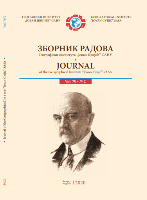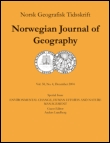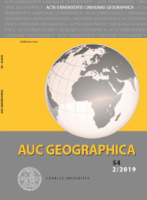
Journal of Geographical Sciences
Scope & Guideline
Navigating the Landscape of Innovative Geographical Studies.
Introduction
Aims and Scopes
- Spatial Analysis and Modeling:
The journal emphasizes the use of spatial analysis and modeling techniques to understand geographical phenomena, such as land use changes, urban expansion, and ecological dynamics. - Climate Change and Environmental Impact:
A core focus is on understanding the impacts of climate change on various geographical scales, including its effects on ecosystems, agriculture, and urban settings. - Sustainable Development and Resource Management:
Research on sustainable development practices, resource management strategies, and the evaluation of ecological services is a consistent theme, particularly in relation to urbanization and rural development. - Human-Environment Interaction:
The journal explores the complex interactions between human activities and natural environments, addressing topics such as migration patterns, urbanization, and ecological resilience. - Geospatial Technologies and Data Analysis:
There is a strong emphasis on the application of geospatial technologies, including remote sensing and GIS, to analyze geographic data and inform decision-making processes. - Regional Development and Planning:
The journal covers topics related to regional development, spatial planning, and policy implications, focusing on both urban and rural contexts.
Trending and Emerging
- Climate Resilience and Adaptation Strategies:
There is a growing emphasis on research addressing climate resilience and adaptation strategies, particularly in relation to how communities and ecosystems can respond to climate change impacts. - Urbanization and Smart Cities:
The trend towards studying urbanization, particularly through the lens of smart city initiatives and sustainable urban development, is increasingly prominent, reflecting global urban challenges. - Biodiversity and Ecosystem Services:
Research focusing on biodiversity conservation and the assessment of ecosystem services is gaining traction, highlighting the importance of ecological health in planning and policy. - Integrated Water Resource Management (IWRM):
IWRM is emerging as a critical theme, with studies examining the interconnectedness of water resources, land use, and environmental sustainability. - Geographical Big Data and Machine Learning Applications:
The application of big data analytics and machine learning techniques for geographical research is trending, facilitating more sophisticated analyses of spatial patterns and processes. - Socio-Ecological Systems and Sustainability:
Research exploring socio-ecological systems and their sustainability is on the rise, reflecting a broader interdisciplinary approach to understanding human-environment interactions.
Declining or Waning
- Traditional Agricultural Studies:
Research focused solely on traditional agricultural practices and their geographic distribution has decreased, possibly due to a shift towards more integrated approaches that consider environmental and socio-economic factors. - Historical Geography:
The emphasis on historical geography, particularly studies that do not connect past events with current geographical issues, appears to be waning as the journal pivots towards more contemporary and applied research. - Single-Dimensional Environmental Studies:
Papers that focus on single-dimensional environmental studies (e.g., only climate impact without socio-economic context) are becoming less common, as the trend moves towards more interdisciplinary approaches. - Geopolitical Analysis without Environmental Context:
Research that analyzes geopolitical issues in isolation, without considering environmental aspects or implications, is seeing a decline, reflecting a broader trend towards holistic analyses. - Local Case Studies with Limited Scope:
The prevalence of localized case studies that do not contribute to broader geographical theories or applications is diminishing, as the journal encourages studies with wider relevance and applicability.
Similar Journals

Hungarian Geographical Bulletin
Fostering dialogue and discovery in geographical sciences.Hungarian Geographical Bulletin, with ISSN 2064-5031 and E-ISSN 2064-5147, is a premier open-access journal published by the CSFK GEOGRAPHICAL INSTITUTE that has been an influential resource since 2009, dedicated to advancing the fields of geography, cultural studies, and agronomy. Located in Budapest, Hungary, this journal aims to disseminate high-quality research and engage a diverse audience of researchers, professionals, and students. The journal's reputation is underscored by its impressive category quartiles in 2023, ranking Q2 in Agronomy and Crop Science, Q1 in Cultural Studies, and Q2 across several other areas, including Geography and Earth and Planetary Sciences. With a Scopus ranking that places it in the top percentiles in multiple fields, the Hungarian Geographical Bulletin serves as an essential platform for innovative ideas and discussions that drive geographical scholarship and practice forward, specifically during its converged years from 2014 to 2024. Whether you are a seasoned researcher or an enthusiastic student, this journal presents a wealth of knowledge that is easily accessible due to its open-access format.

Geografia-Malaysian Journal of Society & Space
Unveiling Spatial Complexities in Malaysian ContextsGeografia-Malaysian Journal of Society & Space, published by the esteemed Universiti Kebangsaan Malaysia through its Faculty of Social Sciences & Humanities, stands as a vital platform for scholarly discourse in the fields of geography, social sciences, and spatial studies. With its ISSN 2180-2491 and E-ISSN 2682-7727, this journal emphasizes the importance of regional studies, fostering a deep understanding of societal dynamics within the Malaysian context and beyond. Although currently lacking impact factor and HIndex data, the journal is poised to contribute significantly to academic discussions, urging researchers, professionals, and students to explore spatial complexities influencing social structures. Geografia aims to publish high-quality, peer-reviewed works, focusing on innovative theoretical and empirical research that addresses contemporary issues in society and space. By promoting open access to its content, it ensures that knowledge is freely available, furthering academic engagement and collaboration in the global scholarly community.

CyberGeo-European Journal of Geography
Innovating Geography: Research Without BordersCyberGeo-European Journal of Geography, published by CYBERGEO, is a leading open-access journal that has been at the forefront of geographical research since its inception in 1996. With a dedicated focus on the multifaceted dimensions of geography, the journal aims to disseminate innovative and critical insights into geographical phenomena in Europe and beyond. The journal has established itself in the academic community, currently holding the Q3 quartile ranking in the Social Sciences (miscellaneous) category for 2023 and recognized within Scopus as #428 out of 604, placing it in the 29th percentile. CyberGeo publishes original research articles, thematic issues, and reviews that contribute to the advancement of geographical knowledge, making it an essential resource for researchers, professionals, and students alike. Situated in Paris, France, the journal embraces a truly international perspective and invites contributions that stimulate scholarly debate and further the understanding of spatial dynamics. By providing open access to its content, CyberGeo ensures that its research is accessible to a global audience, promoting knowledge sharing and collaborative exploration in the field of geography.

Journal of the Geographical Institute Jovan Cvijic SASA
Exploring the intersections of Earth and society.The Journal of the Geographical Institute Jovan Cvijic SASA is a premier academic publication dedicated to advancing research and knowledge in diverse fields such as Demography, Earth-Surface Processes, Geography, Geology, and Tourism. Published by the Geographical Institute Jovan Cvijic SASA in Serbia, this Open Access journal has made significant contributions to the academic community since its inception in 1951, allowing for unrestricted dissemination of research findings globally. With an impact factor reflected in its 2023 Q3 quartile rankings across several categories, the journal underlines its relevance by maintaining a significant standing in the Social Sciences and Earth and Planetary Sciences domains, demonstrating engagement at a global level evidenced by its Scopus rankings. The journal's commitment to publishing high-quality, peer-reviewed articles makes it an essential resource for researchers, professionals, and students seeking to explore and enhance their understanding of geographical and environmental dynamics.

Acta Geographica Slovenica-Geografski Zbornik
Connecting researchers to the heart of geographical inquiry.Acta Geographica Slovenica-Geografski Zbornik is a prominent academic journal published by the Geografski Institut Antona Melika ZRC SAZU, situated in Slovenia. This open-access journal, active since 2003, has made significant strides in the fields of cultural studies, geography, and earth sciences, earning impressive rankings in its respective categories—Q1 in Cultural Studies and Q3 in both Earth and Planetary Sciences and Geography, Planning and Development. With an impactful presence evidenced by its Scopus rankings, including being placed in the 90th percentile for Cultural Studies, Acta Geographica Slovenica serves as an essential platform for researchers, professionals, and students alike, facilitating accessible scholarly dialogue and contributing to the development of geographical and cultural knowledge. The journal is dedicated to advancing research that develops innovative perspectives on geographical phenomena, making it an invaluable resource within the academic community.

Cuadernos de Investigacion Geografica
Unlocking Insights into Our Planet's SystemsCuadernos de Investigacion Geografica, published by UNIV RIOJA, SERV PUBLICACIONES, stands as a premier open-access journal dedicated to advancing knowledge in the fields of geography, environmental science, and earth sciences. Since its inception in 1983, this journal has fostered innovative research and critical discourse, currently holding a distinguished position in Scopus with impressive quartile rankings, including Q2 in both Earth and Planetary Sciences, and Geography, Planning and Development, reflecting its impact and relevance. With an aim to present high-quality, peer-reviewed articles that contribute to the understanding of our planet and its systems, Cuadernos de Investigacion Geografica welcomes submissions from researchers, professionals, and students alike, fostering a collaborative environment that spans across diverse geographical contexts. Operating from its hub in Logroño, Spain, this journal continues to be a vital resource for anyone engaged in geographical research and environmental analysis, providing open access to enhance knowledge sharing and innovation in these dynamic fields.

Documents d Analisi Geografica
Empowering Global Discourse in Geography and PlanningDocuments d'Anàlisi Geogràfica is a distinguished academic journal published by Universitat Autònoma de Barcelona, focusing on the fields of geography, planning, and earth-surface processes since its inception in 1988. With an Open Access policy implemented in 2012, the journal aims to facilitate the widespread dissemination of geographical research and insights, accessible to a global audience. Currently ranked in Q3 for both Earth-Surface Processes and Geography, Planning and Development categories, it serves as a vital platform for researchers, practitioners, and students to share their findings and enhance knowledge in these critical fields. The journal is indexed in Scopus, where it stands at rank #470 in Social Sciences and #106 in Earth and Planetary Sciences, reflecting its growing impact in relevant academic communities. Based in Barcelona, Spain, Documents d'Anàlisi Geogràfica continues to contribute substantially to geographical scholarship by exploring contemporary issues and advancements in a rapidly evolving world.

Norsk Geografisk Tidsskrift-Norwegian Journal of Geography
Fostering dialogue on pressing geographical challenges.Norsk Geografisk Tidsskrift-Norwegian Journal of Geography, published by Routledge Journals, Taylor & Francis Ltd, is a pivotal peer-reviewed journal that has been instrumental in advancing the field of geography since its inception in 1926. With an esteemed Q2 ranking in both Earth and Planetary Sciences and Geography, Planning and Development categories, it serves as a vital resource for researchers, professionals, and students seeking to deepen their understanding of geographical phenomena. The journal's rich historical archive, covering significant periods in geography and environmental studies, showcases a diverse array of articles that reflect ongoing research trends and challenges within the field. Despite not offering Open Access, its impactful content remains accessible through institutional subscriptions, underscoring the journal's commitment to advancing geographical research and fostering scholarly dialogue. As it continues to publish high-quality research, Norsk Geografisk Tidsskrift stands as a key player in geographical scholarship, reinforcing its importance within the academic community.

Geographia Polonica
Fostering Scholarly Dialogue Across Geographical FrontiersGeographia Polonica is a premier academic journal published by the Polish Academy of Sciences, Institute of Geography and Spatial Organization, renowned for its contributions to the field of geography and related disciplines. With a history spanning from 1972, it has evolved into a vital resource for researchers and professionals, addressing a wide spectrum of topics from cultural studies to urban planning and development. Geographia Polonica is indexed with impressive rankings in various categories, including a Q1 classification in Cultural Studies and significant positions in Earth and Planetary Sciences and Urban Studies, reflecting its influence and recognition in these critical areas. Although it operates under a traditional subscription model, its commitment to high-quality, peer-reviewed research ensures that the latest findings and advancements are accessible to the academic community. With its rich archival content and contemporary insights, Geographia Polonica serves as an essential platform for scholarly dialogue, making it an invaluable reference for students, researchers, and professionals eager to explore the complexities of spatial organization and geographical phenomena in a global context.

AUC Geographica
Unlocking New Dimensions in Geography and DevelopmentWelcome to AUC Geographica, a distinguished journal published by CHARLES UNIV PRAGUE, KAROLINUM PRESS, focusing on the expansive and interdisciplinary fields of Earth and Planetary Sciences, as well as Geography, Planning, and Development. With an ISSN of 0300-5402 and an E-ISSN of 2336-1980, this Open Access journal has been freely accessible since 2010, allowing researchers, professionals, and students to engage with high-quality scholarly articles without barriers. As of 2023, it holds a Q4 ranking in its respective categories, reflecting its commitment to contributing to the academic discourse despite competitive landscapes. Located in Prague, Czech Republic, at OVOCNY TRH 3/5, PRAGUE 1 116 36, AUC Geographica aims to foster collaboration and innovative research in the multifaceted relationships between human activities and the natural environment. With a publication history spanning from 1975 to 2024, this journal continues to be a vital resource for those seeking to advance knowledge and explore new dimensions in geography and Earth sciences.